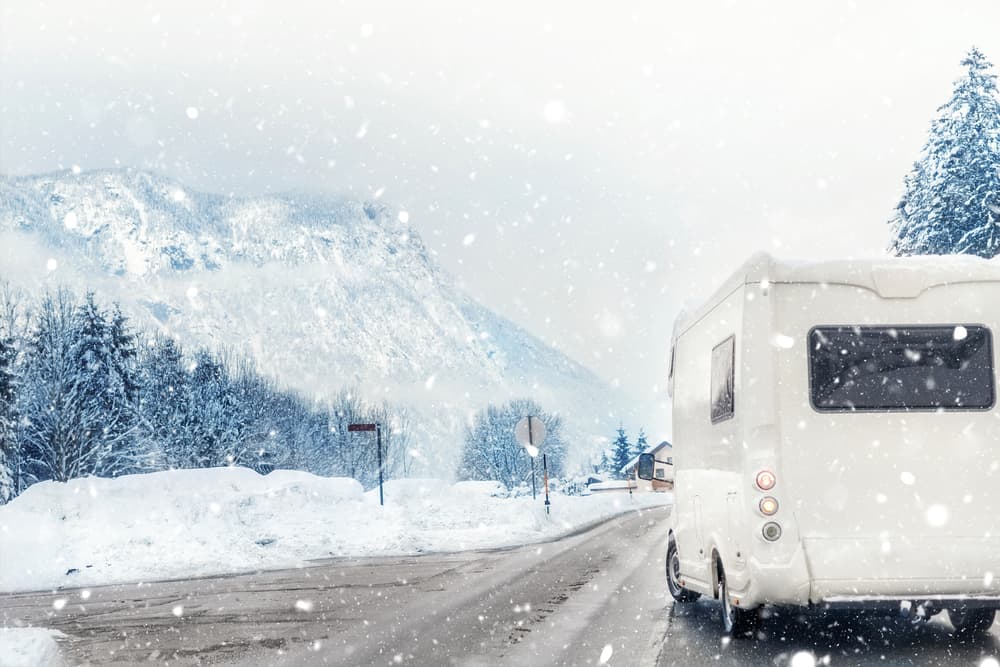Don’t Let Your Plumbing Freeze And Break
Anyone new to camping will eventually start to wonder how to keep RV pipes from freezing while camping. Wintering in an RV can be a wonderful change of pace if you are prepared.
The beauty of an RV isn’t just the freedom to move, travel and camp at your own pace, it’s also the variety of terrain and environments you can tackle on your home-away-from-home. From dusty desert day trips up to cold weather ski trips and more – having a climate controlled place to bring along really opens up a world of exploration and travel.
That’s a big reason RV ownership and travel is so heavily on the rise– go anywhere, just about any time.
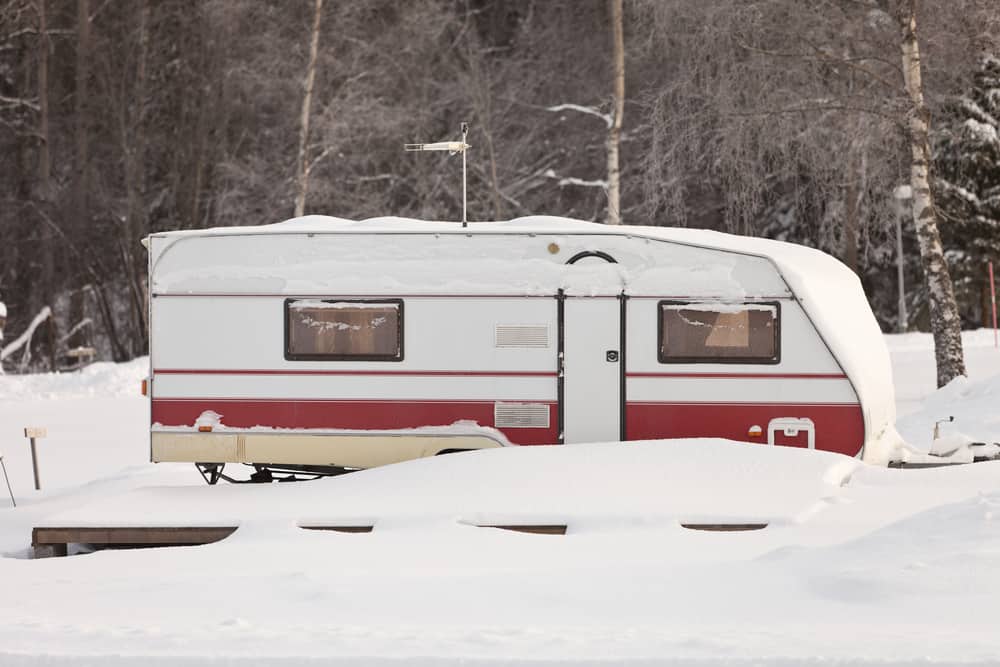
Cold weather destinations are a great option for staying close to home during winter months, as a budgeted way to try ski resorts or a whole new way to experience national parks and outdoor attractions. Sitting snug inside a warm camper surrounded by untouched snow and nearly empty campsites – it’s easy to see why an RV is an attractive option for year-round campers and vacationers.
That doesn’t mean RV owners don’t have their own set of camper specific problems to deal with. Sure you can camp out when and where tent-dwellers wouldn’t dare, but minor weather related problems will arise. Treacherous roads, breakdowns, mid-trip repairs, and, when the cold air comes, you may have to contend with frozen RV pipes.
Even relatively seasonable areas can experience a sudden cold snap, or a frost that lasts long enough to freeze part of your plumbing system. Luckily, there are some easy preemptive measures you can take, if you know the weather will dip, to avoid experiencing frozen RV water pipes, and ways to get thawed out relatively quickly, if the worst happens.
If you’re a new owner, and you haven’t considered the challenge of avoiding frozen water pipes you might have been wondering….
Will RV Water Lines Freeze?
Simply – Yes, absolutely. Many a seasoned RV enthusiast will tell you that pipes freezing is more than just a bummer on a chilly morning – severely or repeatedly frozen over water lines and tanks can cause real damage to your RV’s water system and potentially other areas of your vehicle.
We all know, as water freezes it expands, which can potentially burst pipes, and damage fittings where freezing is more likely to occur.
The fresh water tank, waste tanks, plumbing and lines connecting your RV to park utilities are all vulnerable to freezing temperatures, and possible cracking, splitting and failure, if the freeze is bad enough.
It’s more than a hassle. Have your RV prepared for cold-weather camping, and know what the weather and terrain will be like. It’s better safe than sorry.
How Cold Does It Have To Be To Freeze RV Pipes?
The simple answer is – anytime and anywhere that the weather drops to ‘below freezing’ i.e. 32 degrees fahrenheit, there is the possibility that any part of your water system could freeze over, although certain areas are more prone to freezing than others.
Of course, as we’ll explain, the wind chill, temperature of your RV, insulation, skirting and other weather proofing measures will play a major role in determining how cold it has to get, and how long it will take for your RV to experience problems with the lines and tanks freezing.
Every outdoor environment takes its toll differently when temperatures dip, but there are plenty of preventative measures to avoid problems and possible costly repairs. Any part of the water system could potentially freeze over, the most delicate and vulnerable areas depend on how your RV is heated, constructed and insulated. As a rule of thumb, several areas need the most protection…
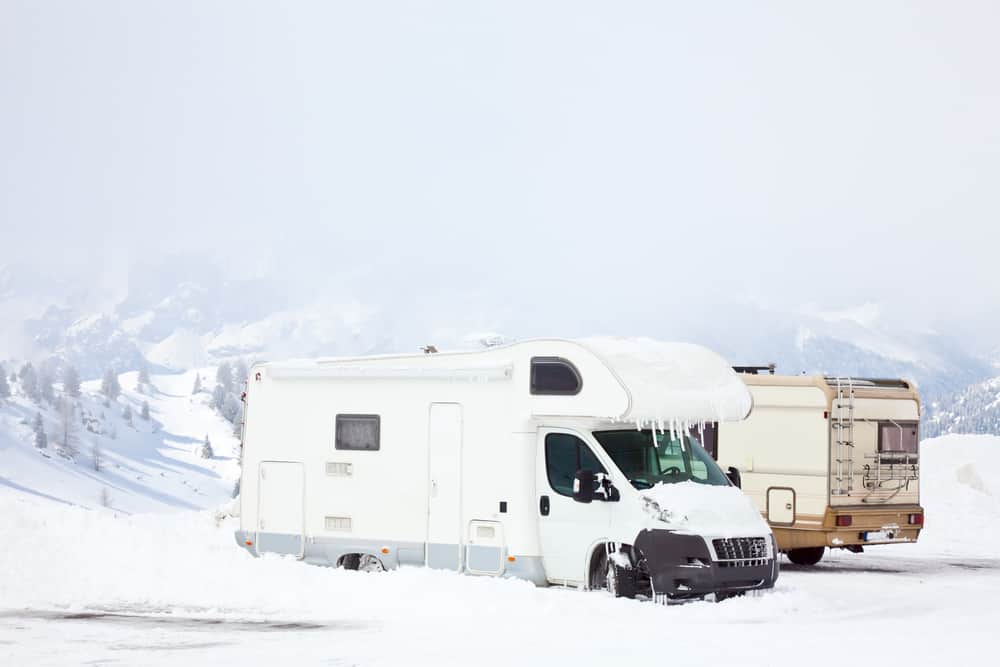
How Do I Keep RV Pipes From Freezing
You wake up on a beautiful, crisp winter day, the snow is falling in fat, gentle flakes all around your campsite and…there’s no running water. From a mild inconvenience, to a disaster-in-the-making, frozen pipes really put a damper on any RV trip.
With a few preventative, inexpensive measures, you can avoid waking up to frozen pipes, and possible expensive repairs mid-trip, and enjoy the heck out of winter RV camping!
RV Insulation
An obvious way to keep your pipes warmer, and prep for cold weather travel, is to have adequate insulation around your RV. It’s a good idea to have your vehicle well-insulated- it’s a money-saver in the long run, can be installed relatively easily and keeps your whole RV nice and toasty.
It requires very little maintenance, and can generally be left on year-round. If you haven’t invested in RV insulation, and you’re a dedicated winter traveler, it’s a good first step to protecting every component of your vehicle.
Related Articles
- Inspirational Christmas Decorating Ideas for Your RV
- Ultimate Guide To Boondocking
- RV Length For EVERY National Park Campground
- Best RV Destinations For This Year
A contractor can install foam insulation to the RV underbelly, but there are several simple options you can even do yourself, that give you added warmth and protection with very little investment.
Make sure your doors and windows are sealed, and the exterior weather stripping is in good condition. Tiny holes and gaps in the sealant can make a big impact on how warm your RV interior stays during cold weather. A warmer cabin means you are less likely to experience freezing and bursting pipes and water system damage.
You can also install insulating window coverings. Cut foil lined insulation to size and place in your windows for extra protection, and try heavy curtains or drapes over windows and doors.
It’s not a bad idea to invest in some RV skirting. The removable winter skirting keeps wind whistling under your RV and damaging sensitive components and sucking heat away from the RV. The skirting can be taken off and stored during summer months.
You can also try foam insulation boards under the RV with or without the skirting, and even heavy rugs inside can curb the cold that seeps in from underneath the RV.
Heated Water Hoses
You can buy heated water hoses as your supply hose for fresh water. These hoses have a thermal wrap that keeps the hose from freezing. They are a little expensive may save you a LOT of trouble down the line. A heated water hose is your first line of defense against the cold as it also heats the water entering your rig, helping to keep pipes inside from freezing.
Hose Wraps
Every RV is different, with different plumbing. If you don’t already know where your plumbing runs, and whether it is already heated or insulated, check your RV manual or go have a look for yourself. Pipes that are uncovered or run outside of the coach are, not surprisingly, much more likely to freeze and cause problems.
Frost King Pipe Tape
- Cuts wasteful heat loss on hot water pipes
- Prevents cold water pipes from sweating
- Easy installation
- Reduces energy loss
One of the most inexpensive options is to add insulation tape to your pipes. It’s very easy to do yourself, and if pipes run outside the cab, it’s a good bet that they could benefit from some extra insulation. Get some insulation tape and wrap it generously around any pipes, your freshwater hose and sewer hose, and the fittings and valves to keep the pipes warm and give extra protection against freezing.
Heat tape is another option that can be used around freshwater hose and sewer hoses to keep the lines warm. Heat tape is trickier than insulation tape and should be applied carefully – always read the manufacturer’s suggestion when wrapping your hoses.
Keep The RV Warm
Besides wanting your vehicle nice and warm for basic comfort, keeping your cabin warm does a lot to prevent even outside lines and tanks from freezing over and causing problems. Before you do any winter-weather traveling, you’ll want to make sure your RV furnace is clean, working and free of debris.
You can clean the furnace yourself, but you may want a checkup from a professional technician to make sure your RV’s furnace is ready for sudden cold temperatures, especially if you’re planning on traveling in areas that experience extreme cold.
Small Space Heater
- 2 in 1 heater fan: This ceramic heater provides two heat levels, 1500W or 750W and one cool air fan
- These electric heaters are made of flame retardant material avoiding any fire hazard. Automatic safety shutoff system.
- The noise this ceramic heater makes is lower than 45 decibels, quiet enough for most people to use in a bedroom while sleeping.
You might find you need additional heating in cold months, and you may have, or want to buy a space heater. Small RV space heaters do carry risk – including adding condensation or humidity that could damage components in your RV.
You may also need a dehumidifier, and of course pay attention to all manufacturer safety guidelines. Running a small space heater in the “basement” or underneath the RV (as long as it is weather wrapped) can be very effective in keeping everything from freezing.
Open Cabinets that Hold Pipes
Although interior pipes are less likely to freeze, and especially if you keep the rig warm and the furnace running, plumbing can freeze. Keep cabinet doors in the kitchen and bathroom open so warm air inside can circulate around the pipes to keep water flowing freely. You can even install extra insulation or insulation tape to exterior cabinet walls.
If you see any holes or gaps between the plumbing and exterior, fill those too. It’s added insulation to prevent cold air from coming in and keeps out pests.
Run Water Through the Night
Another option, to ensure pipes and tanks don’t freeze during cold winter nights, is to keep the water holding tanks open and water flowing. This method is sometimes used in residential homes to keep lines running, because running water just doesn’t freeze as easily. Again, make sure you keep the tanks open and draining.
Though whether it’s the best option long-term is up to you. You actually need about a pencils’ width of water running through the lines to keep freeze at bay. If you’re hooked up to freshwater at a campsite, this is obviously much easier.
Running your own freshwater supply through the night is not recommended unless it is your last option. Keep in mind that this would keep your water pump going all night, and you would probably run out of water in your fresh tank.
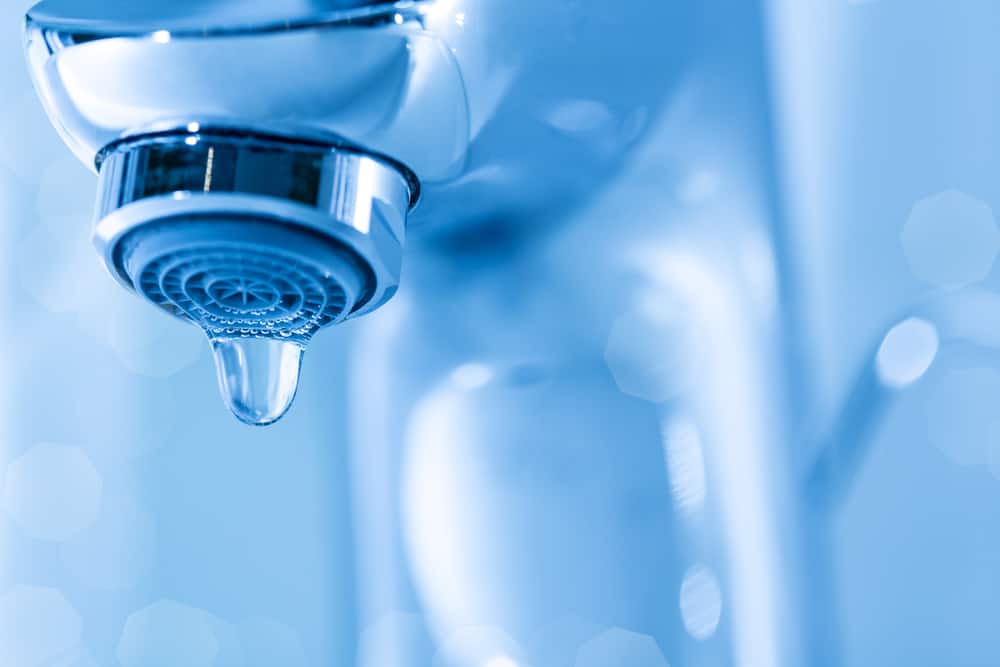
Empty All your Lines
If you’re simply storing your RV, or parking it long term without living in it, this one is easy. Simply empty all your tanks and water lines. This keeps water from expanding and ruining fittings, splitting hoses, cracking tanks and causing very expensive repairs while your RV isn’t in use.
Of course, if you’re a full-time RV traveler, this really isn’t an option. If you are parked at a campsite, and you are really worried about freezing, emptying your RV Plumbing and tanks is a last resort to avoid damage.
You’re still going to have to be very thorough about draining lines fully, and letting them rest downward as any left over moisture trapped in kinks and elbows could potentially freeze and still cause damage.
How Do I Keep Grey And Black Water Tanks From Freezing?
That’s right, in cold climates, your grey and black tanks are at risk of freezing. We don’t need to tell you why cracks and failures in your holding tanks spell disaster.
Besides your thin pipes, connections and plumbing, the next thing to worry about are the holding tanks, and if you are planning on camping during winter months, you should be prepared to keep these warm and prevent freezing.
A standard way to prevent freezing in both your gray water tank and your blank water tank is to add RV antifreeze to the holding tanks. This is a specialized, non toxic antifreeze made for RV’s and boats.
As water moves through the system you’ll have to keep adding it, by flushing it down the toilet (for the blank tank) and running it down the sink (for the grey wastewater tank).
The amount will vary based on how large your tanks are, and how often you fill, and drain them.
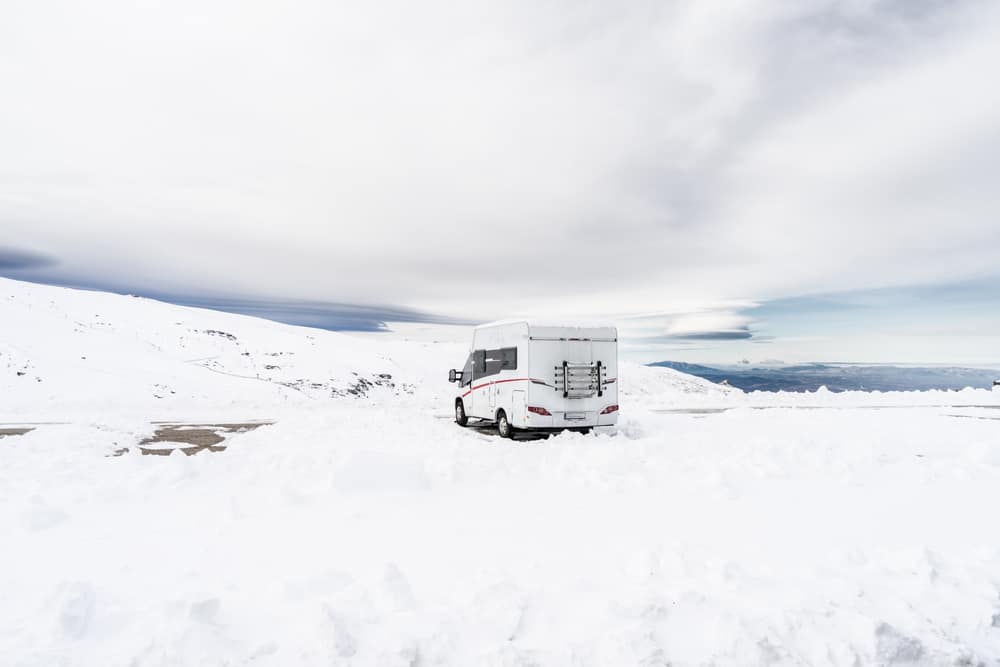
Drain your Tanks Before Nightfall
If you’re still worried about your tanks freezing when the weather drops at night, and you’re at a campsite with hookups, it’s pretty easy to just drain your holding tanks before the temperature drops.
Normally, you want to be smart about when you drain your tanks – partially full tanks freeze much more easily than fuller tanks, but completely full tanks run the risk of freezing and expanding enough to crank connections and back up.
You have to be very careful to completely drain your lines, and that your lines are running sloped towards the hookups, and up off the ground so the lines drain completely.
Use an RV Tank Blanket
If your RV does not have a tank heater, RV tank blankets are an easy solution for keeping your tanks warm enough to prevent freezing when temperatures drop. They are really just electric blankets that you plug it in and put over your tanks. Installing these is easy enough for you to do yourself.
These blankets will work on your freshwater tank as well as the black and gray.
Skirting and Heating The Underbelly
If you are staying in one place for the winter, another method of insulating is to skirt the RV with foam board insulation, plywood, or something to keep the wind out.
This is a very good idea and will help tremendously with pipes and tanks. SOme people use straw bales as well. This is fine as long as you will not be heating this space. With foam board, you can put an electric heater (NOT a propane heater) underneath to help keep the space warmer during very cold snaps.
Again DO NOT use a portable propane heater, or any other type of heater that uses fuel or has a flame.
RV Tank Heating Pad
- Simply turn “ON” the power switch when the outside temperature is near to freezing.
- Pad size L 18” x W 12” works efficiently up to 50 gallon holding tanks, such as Fresh Water Tanks, Grey Water Tanks and Black Water Tanks.
- 3mm Foam Insulation Pad with self-adhesive make installation easy.
What To Do If Your RV Pipes Freeze
Sometimes it happens. Maybe you were caught by a cold snap you didn’t expect, maybe temperatures got much colder than you thought or maybe you’re just preparing for the worst – if your pipes and water lines DO freeze, there are some simple steps to take to get them back to running smoothly, and avoid any more damage to the system.
When you wake up to frozen pipes, you’ll want to locate where the freeze has happened. The likely culprits are outside, and whenever the lines and fittings are exposed. Check for condensation and cracks before you begin unthawing.
If you don’t see cracks, and you have heat tape, you can apply heat tape to the frozen area and turn it on to try and warm up the frozen area. You can also take a space heater or a hairdryer to the frozen area to warm it up. Never leave a space heater unattended, and don’t focus a heater on sensitive components.
For frozen copper or steel plumbing, you can try using a plumber’s torch to heat the frozen area. Again, check for cracks.

Another option, if you came prepared, is to apply a heat gun to the frozen hoses and connections. A heat gun is pretty intuitive – just point it at the frozen area while moving it around and changing angles. Always check the connections and lines for cracks, and don’t force the connections open until they’re completely thawed.
If you’re unsure why your RV lines froze, you’ll want to double check your preventative measures to find out where the issue lies. And if all else fails, and it’s not too cold, you can just try raising the internal temperature of the cabin and hope that is enough to warm up the pipes and lines.
Hopefully your first freeze isn’t bad enough to split hoses, damage connections or crack components of the water system. It’s no fun waking up on a cold morning without running water, but good insulation and pre-emptive measures will not only lift this inconvenience but most importantly keep your RV safe and in good shape.
Of course after you successfully thaw your RV piping, you’ll want to take a look at where the freeze happened, and take preventative measures so it doesn’t happen again.

Freezing pipes and water systems are an important thing to think about whenever you’re heading out during the winter, camping at altitude or venturing into a colder climate.
There is truly something special about spending a quiet winter’s day, bundled up in your RV, watching the snowfall and experiencing a really beautiful time of year. With the right preparation and foresight, there is no reason you can’t enjoy camping all-year round.
And if you’re really an RV lifer, you’ll likely have some cold months to prepare for. Simple steps, planning and a little investment will keep you comfortable, and keep your RV’s pipes flowing great no matter where you’re headed. Enjoy these gorgeous winter months in a special way, worry free. Grab a cup of cocoa and keep those pipes clear on your next winter camping trip.
Winter RVing: How To Keep Pipes From Freezing

Frank Foley
Frank is the Head Hubby, Daddy, and Fix-It Guy of the Roving Foleys clan. He ia an avid traveler and has spent over 5 years traveling full time with his family. he loves helping others learn about the RV life. He has also traveled in Europe, Asia, and Australia with his wife Grainne.

